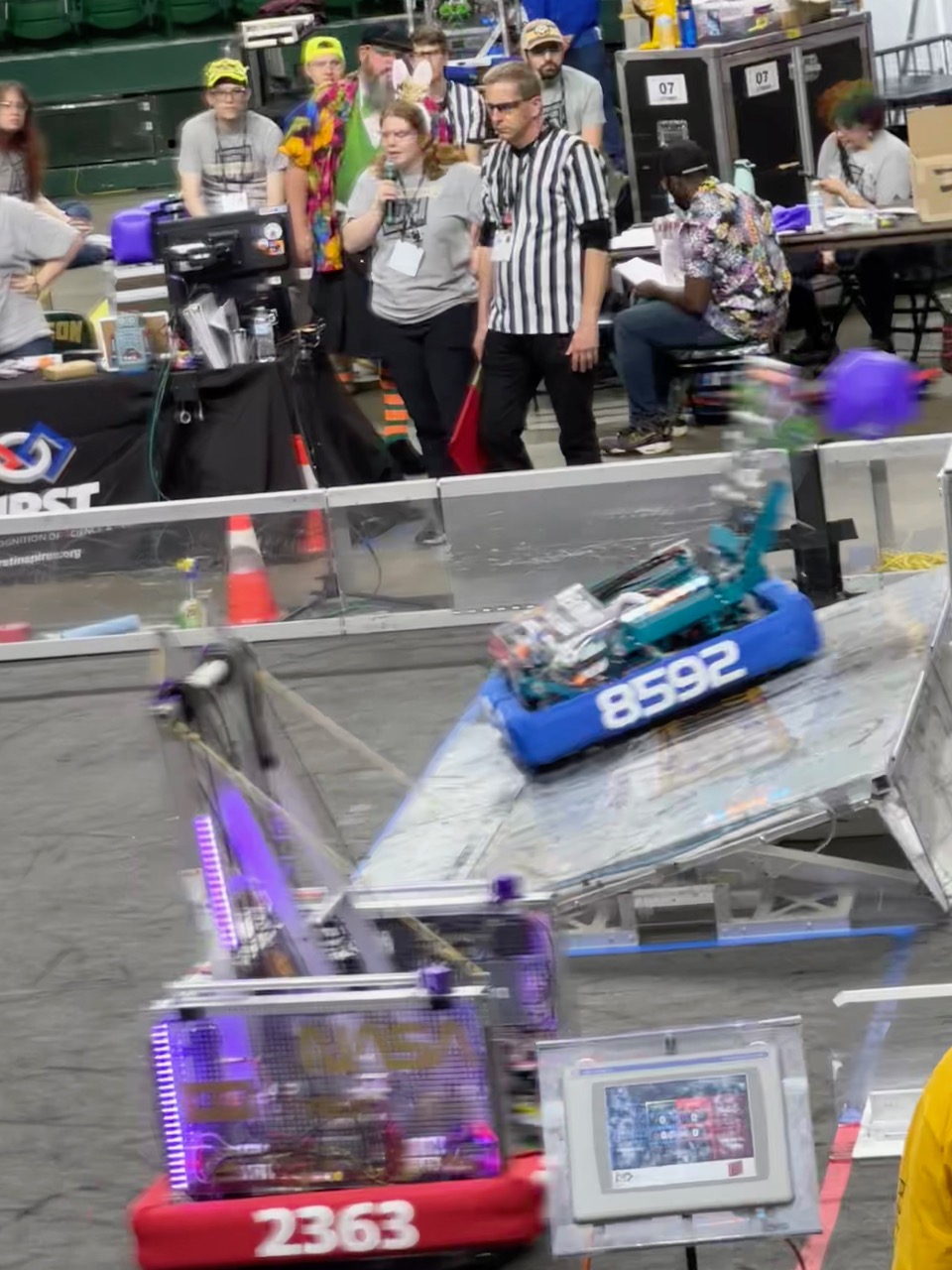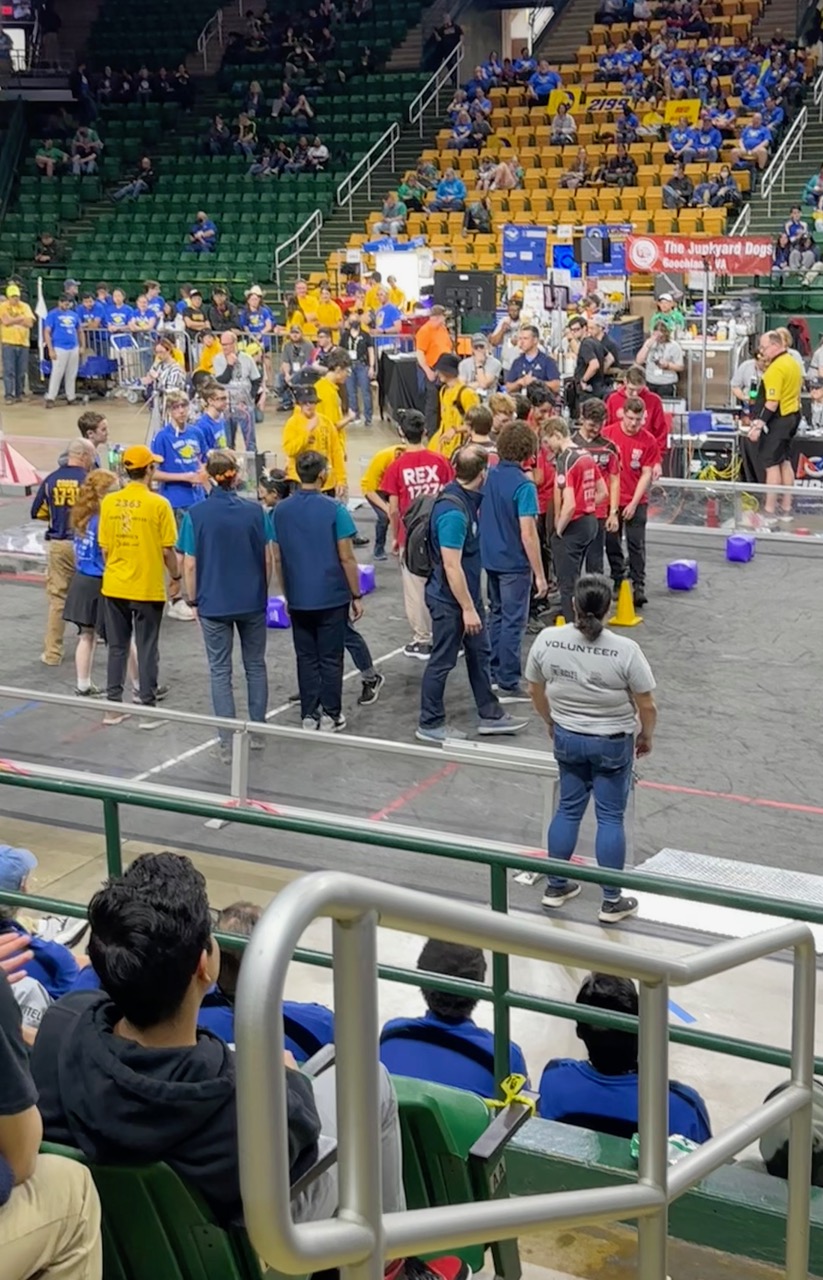Wednesday, April 12, 2023
 Newton2 driver saves precious seconds by using the extension arm to toss a cube into the grid
Newton2 driver saves precious seconds by using the extension arm to toss a cube into the grid
The FIRST Chesapeake District, encompassing teams from the District of Columbia, Maryland, and Virginia, fielded 60 teams for the Fairfax event, including a dozen teams from the northern Virginia area. REX, #1727, a Lutherville-Timonium Maryland high school team, came into the district championship competition ranked number one for the season. Highest ranked among the northern Virginia teams, were Newton2, #8592, a Fairfax community team, and Vae Victis, the Meridian High School team from Falls Church. It would take 120 qualifying matches over the three days to determine the District Champions. (For more on local teams, see Connection, March 22-28, http://www.connectionnewspapers.com/news/2023/mar/22/robotics-teams-charged-compete/)
Robotics competition is described by FIRST as “the ultimate sport for the mind.” High school students build industrial-size robots to play a difficult field game in alliance with other teams. Two competing alliances of three robots bring game pieces to their communities. Alliances compete for 54 cone and 44 cube pieces to bring from substations to their grid for points. In the first 15 seconds of competition the robots must perform autonomously with preprogramed instructions. Points are scored by leaving their community, bringing game pieces to the grid and docking on their charge station. In the remaining two minutes and 15 seconds of each match, drivers take control of the robots. Drivers score points in the same manner. Alliances gain additional points by linking groups of three adjacent game pieces on the grid. Fouls can result in giving 12 points each to the competing alliance and so are avoided.
As FIRST relates, “This isn’t combat robotics.” No intentional tipping or entangling is permitted and there are rules about blocking opponents. Although judging recognizes that competition “can be full contact and include rigorous game play.” At the end of the match each alliance attempts to align all its robots on the charge station in the final seconds. The alliance with the highest score at the end of the match wins and its teams advance.
Not every team would go home a winner or qualifier for the world championship. Vae Victis #1418 would be eliminated before reaching the finals. Speaking for the Falls Church team Nina Miller said, “We had a good run.” Explaining the team would start planning for the next season, and maybe celebrate their successes from this season. They would leave the event with the Gracious Professionalism Award, one of 15 performance awards earned in the season.
Chantilly Academy’s club, Chantilly Robotics, was eliminated before the play-offs. Ron Baer an electrical engineer who coaches the 80 member group says their team will spend the next months in team leadership selection. Their team is run along the lines of a corporation, with CEO, CFO, and captains. Senior members interview and select others for junior positions. He also indicates it’s a time to consider new mechanisms, like more advanced swerve drives, to improve their performance in the next season.
Newton2, although not a winner for the day, remains in high standing and enthusiastic. The team received the “Excellence in Engineering Award”, one of 15 awards they received during the season. Ethan Stuart commented that they were grateful that REX, #1727, invited them to join their blue alliance for the final match. Although they were not the winning alliance, Liam Monaghan explained both teams had already qualified for the world championship by past performance. Elimination in the final at Fairfax did not impact their attendance at the international championship being held April 20-22 in Houston, Texas. They describe their preparation for that next event as “looking at what went well and bad and fixing any issues; doing some minor tune-ups.”
The final two matches would go to the red alliance of teams Triple Helix, #2363, of Newport News, Va., Robo-Lions #2199, of Finksburg, Md., and Fresta Valley Robotics #1731, of Warrenton, Va., with red alliance to blue scores of 157 to 144, and 179 to 165.
The international championship competition in Houston will pit 338 registered teams from around the globe. Teams from Australia, Brazil, Canada, Chinese Taipei, Israel, Japan, Mexico, and Turkey make the event truly international. It seems that celebrating science, technology, engineering, math and preparing young people for the future is a shared interest around the world.
 Remaining teams meet mid-field for handshakes before the final matches
Remaining teams meet mid-field for handshakes before the final matches